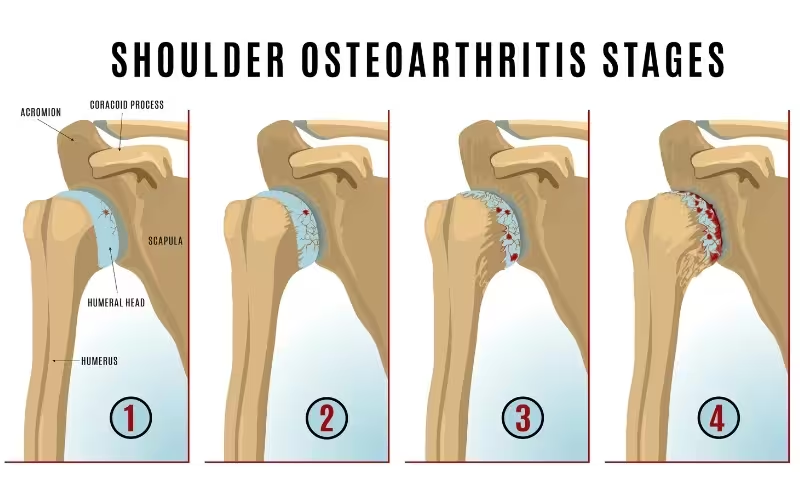How much does private shoulder replacement surgery cost in the UK?
If you’re experiencing shoulder pain, a shoulder replacement could be the solution. If you’re already on a waiting list, you might wonder what the surgery will involve and whether you’ll be better off opting for private surgery. Here’s our guide to private shoulder replacement surgery to help you decide.
Are you stuck on a waiting list and looking for treatment?


What is a shoulder replacement?
Shoulder replacement surgery replaces your shoulder joint with an artificial implant. When your shoulder joint is functioning normally, the ball and socket joint fits neatly together with the movement cushioned by cartilage; if the cartilage becomes worn or damaged, you can end up with a damaged ball that doesn't move as smoothly as it should.
A shoulder replacement uses metal and plastic implants to replace the damaged areas and get your shoulder moving freely.
You'll typically need a shoulder replacement because of wear and tear or damage to your shoulder that causes pain and restricted movement.
Our risk of developing arthritis increases as we age, which is one of the most common reasons for shoulder replacement surgery. Our family history can increase the risk, and osteoarthritis can also develop due to injury.
You may also need surgery because of the following:
- Rotator cuff tears that can't be surgically repaired.
- Severe fractures.
- Failed surgery.

You have the right to choose which highly-skilled NHS surgeon carries out your surgery and which hospital you attend. However, there are some advantages to private treatment which the NHS can't provide.
Shorter waiting times
Shoulder pain can severely impact your day-to-day activities. Quick treatment lets you get back to enjoying life pain-free.
The pandemic severely impacted NHS waiting times, and non-urgent elective procedures were the hardest hit. The latest figures show that there are currently 6.8 million patients waiting for treatment, with over 300,000 waiting for more than a year. By contrast, you could receive private treatment within a few weeks.
Choice of hospital and clinician
Whilst you can choose your surgeon and hospital with the NHS, private treatment gives you more options. You can choose a hospital with particular facilities or a convenient location. Many consultant orthopaedic surgeons work both privately and in the NHS.
You can find out more about choosing a private consultant and hospital in this guide.
New technologies
Private healthcare providers invest heavily in new technologies to deliver better results. You may also be able to access medications the NHS doesn't currently fund.
The cost of private shoulder replacement varies depending on various factors, with the location being the most significant as it impacts wages, rent and utility costs.
How the cost of a private shoulder replacement varies across the UK
The average cost of a private shoulder replacement in the UK is £13,341 (September 2024).
Here's how the average cost varies in cities across the UK:
- London = £13,395
- Manchester = £13,050
- Southampton = £11,753
- Belfast = £14,243
- Glasgow = £11,895

These average costs also vary within cities depending on your chosen treatment provider. You can read more about the costs of private healthcare in the UK and the factors by clicking the link in this sentence.
The type of shoulder replacement surgery your surgeon recommends depends on factors including the condition of your shoulder muscles, your bone strength and the stability of your shoulder joint.
These are the four main types of shoulder replacement. You may also be offered revision surgery if you have an implant that has worn out.
Reverse shoulder replacement
This is the most common replacement surgery and involves switching the positions of the ball and socket in your shoulder joint by attaching a metal ball to your shoulder blade and a new socket to the top of your arm.
Total shoulder replacement
The surgeon replaces the ball at the top of your upper arm with a metal ball and your existing socket with a plastic implant.
Partial shoulder replacement
This involves replacing the ball with a metal one but leaving your original socket.
Resurfacing
The surgeon removes the ball's surface and places a cap on it in partial resurfacing. They will replace the socket with a plastic implant in full resurfacing.
You'll usually be offered other treatment pathways before shoulder replacement surgery. These can include:
- Physiotherapy
- Anti-inflammatory medication
- Local anaesthetic or steroid injections
- Shoulder arthroscopy
If you've decided that private shoulder surgery is the right choice, here are your main options to fund your treatment.
Self-pay
This is the most straightforward way to pay for your surgery, as you can make an appointment with the surgeon of your choice and pay them directly. You can book a private consultation or ask for a private referral if you've already seen an NHS consultant orthopaedic surgeon.
Medical loan
Most private healthcare providers have private finance partners offering loans to allow you to spread the cost of your surgery. These typically offer 0% finance for up to a year. You'll need to qualify for credit like any other loan.
Private health insurance
If you have private health insurance, you can contact your provider to see if your policy covers your surgery. However, it may be excluded as a pre-existing condition if you've had shoulder problems before.
Related articles:
Before surgery
Before surgery, you'll be invited to the hospital for pre-operative checks. Your consultant will take details of your medical history, and you'll also have blood tests to check whether you can have an anaesthetic and are in good health.
They'll also advise you on preparing for your operation, for example, by giving up smoking. Your surgery will likely be carried out under general anaesthetic, and your consultant will talk you through the details and how long you should avoid eating before surgery.
This is a good time to ask questions about your recovery so that you can plan for any help you might need after your operation.
The procedure
Shoulder surgery is carried out by orthopaedic consultants specialising in this type of surgery. Before surgery, you'll be given an anaesthetic. This may be general, local or a combination of both.
During surgery, the surgeon makes an incision into your shoulder before replacing the ball or ball and socket with an artificial joint. The operation typically takes about 1-1.5 hours. The incision is closed with stitches or clips and covered with a dressing.
Aftercare in hospital
After your operation, you'll be monitored as the anaesthetic wears off and given medication to relieve pain. Most patients need to stay in the hospital for a few days after surgery.
Before you're discharged, you'll see a physiotherapist who'll help you get your shoulder moving and give you some exercises to do. You may also have an x-ray which consultant radiologists will check to ensure that your new shoulder joint is in the correct position.
Recovery and symptoms
When you go home, you'll be given pain relief, a sling to support your shoulder and an exercise plan to help you improve the movement in your shoulder and prevent stiffness. They'll also let you know which movements to avoid.
You'll need to avoid heavy lifting for about six months, and you may need to avoid driving for a few weeks. Your surgeon will guide you, and you'll also need to tell your insurers.
Recovery from a shoulder replacement typically takes 3-6 months. Your surgeon will advise you about returning to work and resuming your normal activities.
After surgery, you can expect to experience some side effects, including discomfort, restricted movement and numbness around your scar or in your arms. These should settle within a few weeks.
There is a risk of complications with any surgery. Your consultant will take preventative measures, for example, prescribing antibiotics to prevent wound infection and providing a pressure stocking to reduce the risk of DVT.
Here are some potential complications:
- A reaction to the anaesthetic
- Excessive bleeding
- Infection
- Accidental damage to muscles and nerves
- An upper arm fracture
Some issues may need further surgery, including joint instability or movement in the replacement parts.
We hope that this shoulder replacement surgery guide helps you understand the procedure and your treatment options.
What our readers say
We are rated Excellent on Google from 150+ reviews. Our reviews relate to the service provided by both myTribe and its partners.
Disclaimer: This information is general and what is best for you will depend on your personal circumstances. Please speak with a financial adviser or do your own research before making a decision.
Frequently Asked Questions
How much does shoulder replacement surgery cost?
The average cost of a private shoulder replacement in the UK is £13,669 (October 2024).
How long will my shoulder replacement last?
Most artificial shoulder joints last for at least ten years.
Can I have shoulder replacement surgery at a private hospital?
Yes. All of the main private healthcare providers offer shoulder replacement at their hospitals.
How long will I be off work after the shoulder replacement?
This depends on your work, so you'll need to take your surgeon's advice. You'll need to avoid heavy lifting for around six months after your operation.











